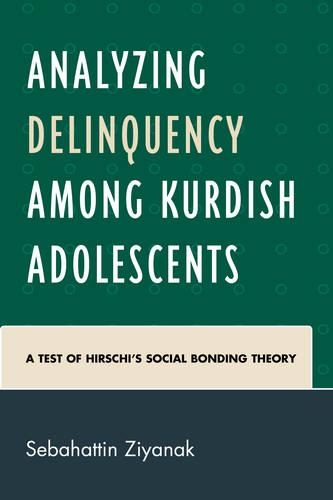
Analyzing Delinquency among Kurdish Adolescents: A Test of Hirschis Social Bonding Theory
(Hardback)
Publishing Details
Analyzing Delinquency among Kurdish Adolescents: A Test of Hirschis Social Bonding Theory
By (Author) Sebahattin Ziyanak
Bloomsbury Publishing PLC
Lexington Books
22nd October 2015
United States
Classifications
Professional and Scholarly
Non Fiction
Ethnic studies / Ethnicity
Social and cultural history
Middle Eastern history
364.956
Physical Properties
Hardback
154
Width 159mm, Height 237mm, Spine 17mm
372g
Description
Analyzing Delinquency among Kurdish Adolescents uses Hirschis social bonding theory to examine the mediating effect of social bonding on delinquent behavior among Kurdish teenagers, who were used as a case study to test the usefulness of this theory. In this study, participants were selected from one Glen movement affiliated school and one public or non-Glen affiliated school. This study sheds light on Turkish societys chaotic conditions in southeastern Turkey, particularly with respect to Kurdish adolescents involvement in the Kurdish Workers Party (PKK). There is a lack of research regarding how Kurdish adolescents are involved in delinquent behavior as portrayed in popular Turkish media. Social bonding theory, developed and mainly tested in American and western European contexts, needs additional exploration of its efficiency in a nonwestern, especially Islamic, society. Thus, this book helps to better understand the factors that influence crime and delinquency in developing, culturally diverse social structures. Scholars in sociology, psychology, and criminology, as well as in the fields of political science, Middle Eastern studies, and education, will greatly benefit from this study.
Reviews
The Kurdish issue or the Kurdish problem has been one of the most important issues in the history of the Republic of Turkey. Hundreds of studies were done over the course of the conflict, but most studies, however, focus on the armed conflict rather than the social aspects. Dr. Ziyanak looks at the mediating effects of social bonding on delinquent behavior among Kurdish teenagers and offers explanations on how Kurdish adolescents are involved in delinquent behavior. It is a well-researched and must read book for those who study Turkeys Kurdish problem. -- Dogan Koc, Gulen Institute at the University of Houston
This book is a welcome and original contribution to the field. The research is careful and complete to a great extent, and the theoretical framework of the study is well planned and concisely addresses the issue at hand. Further future studies can make use of the deep interviews, data collection, and data analysis. Academic PhD students and researchers in sociology, criminology, political science, or religious studies will definitely be interested in this book. -- Ihsan Yilmaz, Fatih University, Istanbul
Author Bio
Sebahattin Ziyanak is adjunct faculty at the University of Texas of the Permian Basin.
